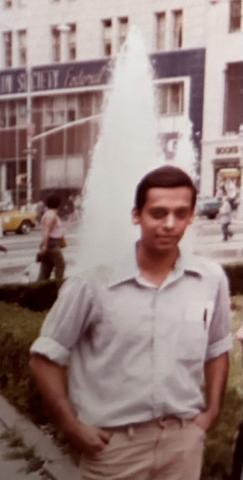1. What made you immigrate to the United States?
I initially had no plans to immigrate to the U.S. The plan was to go to the U.S. to pursue my PhD in Physics and to then go back to India after a few years of relevant work experience. I had done my Master’s from IIT Kanpur and although IITs are great teaching institutions in India, I did not feel that they matched up to the best research institutions in the U.S. So, I came to the U.S. in 1977 as a PhD student at Columbia University in New York. Following graduation, I worked for a couple of years in Germany and the U.S. I then moved back to India for what I had hoped was a permanent move. However, after working in India for several years, I realized that things were not panning out as I had hoped. So we finally migrated to the U.S. in 1992.
2. Who met you when you arrived and what did you do on that first day?
I arrived at John F. Kennedy International Airport in New York. I was supposed to meet some volunteers who would help newly arrived international students. However, I missed my connecting flight in London and I therefore reached New York a day later. Luckily, there was another group of helpful volunteers at the airport and they dropped me at a YMCA hostel somewhere in midtown Manhattan. It was late in the evening and I did not know anyone there, and so I slept early to be well-rested for my next day’s adventure.
3. What were some memorable experiences as you were settling down in the first few months – both positive and negative?
I remember coming to the U.S. with just $50 in my pocket, since the Indian government rules did not permit taking more U.S. currency out of the country. So, on the next day, rather than waste a precious $10 on a taxi, I decided to walk 35 blocks from the YMCA to Columbia University. Luckily, the University started my fellowship soon after I registered. Other IIT Kanpur alumni at Columbia also helped me settle down. For my first year, I stayed at the International House, adjacent to the Hudson River, which was at a walking distance from the campus. That was a great place as we got to interact with students from every country of the world, as well as American students.
In those days, the Physics Department of Columbia University had three Nobel Laureates in its faculty of 25 professors. For a new student from India like me, this was beyond belief. In India, we never had more than one Nobel Laureate in the entire country at any given time, and so they were worshiped like gods. In a striking contrast, Nobel Laureates in the Columbia Physics Department moved around like mere mortals and were very easy to interact with. I remember, during my first week as a PhD student, I was sitting at a small table in the library when Dr. Isidor Isaac Rabi, a Nobel Laureate, came and sat at the same table just two feet from me. Dr. Rabi had worked on the Manhattan Project, which helped develop the first atomic bomb (he was even shown in the recent box office hit, “Oppenheimer.”) That was the first time in my life that I had met a Nobel Laureate, and this memory of that chance encounter is unforgettable.
Outside of the University, I loved American fast food, and remember having Kentucky Fried Chicken several times a week. A few weeks after I came to New York, I experienced my first snowfall. Sometimes we would walk through a few feet of snow just to enjoy that new experience. I also remember a trip organized by the International House to Upstate New York, close to West Point. We stayed outdoors in log cabins surrounded by the fall foliage, and I got an up-close experience of the beautiful fall season for the first time. New York had so much to see and experience, and it kept me occupied whenever I was not busy with schoolwork.
The only negative experience I remember was in my second year as a student, when I was sharing an apartment with two other students. Unfortunately, I had forgotten to latch the window and thieves broke into the apartment. While I only lost my record player, my friends lost much more. We then called 911, and the New York City Police Department (NYPD) officers showed up. They could see the fingerprints of the intruders all around the window but did not do much with them. They gave us hollow assurances that they would pursue the matter, but we could tell that the NYPD had more important things to worry about than to recover the meager belongings of a few foreign students.
4. Looking back on your initial days, what advice would you give to new immigrants arriving in the United States today?
The world has changed so much since I first arrived in the U.S. in 1977. We did not have the Internet, which instantly provides any information you might need, or cellphones, which can connect you with anyone you need to talk to. So the risk of unwanted adventures for a newly arrived immigrant are much lower. I would still advise the new immigrants to do their homework and keep themselves informed about what they should expect in the first few days after arriving in U.S. It will also help to connect with some close friends or relatives who could be counted upon to help if necessary.

